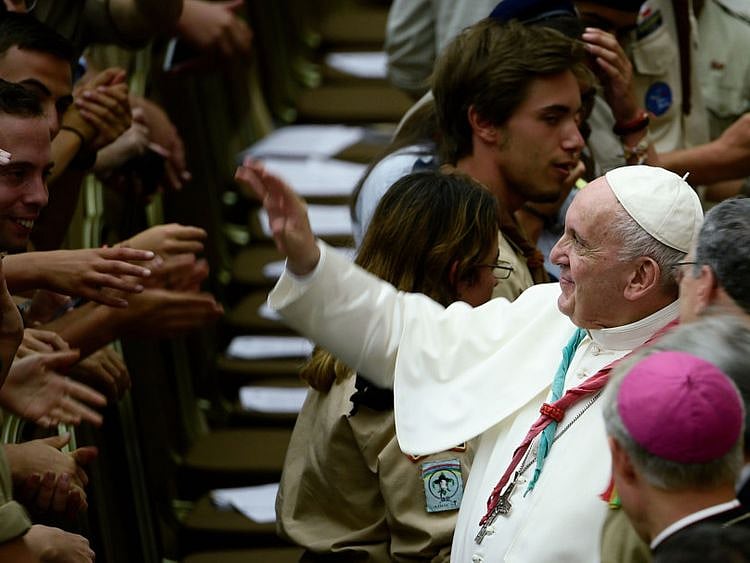The pope and the populist
Relations between the pope and Italy’s deputy PM are becoming increasingly fraught

The relationship between Vatican City and Italy has long been a symbiotic one — the papal state is roughly 400 hectares in size, has 800 full-time citizens and is surrounded by a 10-metre-high wall completely within an area of west central Rome, close to the River Tiber.
Pope Francis is spiritual leader to the world’s 1.1 billion Roman Catholics and, as an outspoken advocate of human rights, is increasingly on a collision course with Italy’s Deputy Prime Minister Matteo Salvini, the leader of the League and a man who has become the ugly face of anti-refugee sentiment not only for his nation of 60 million but increasingly so for the Right across the European continent.
It’s become a classic confrontation between the pope and the populist. Since the European elections last May and through campaigning for Italy’s local elections, Salvini has become increasing critical of Francis’ teachings on the settlement of refugees in Europe. Central to the Christian faith is an ethos of loving all equally — and that includes the hundreds of thousands of refugees who have journeyed on leaky boats across the Mediterranean Sea, with most being picked up and deposited in Italy — until last year when Salvini’s League entered a coalition government deal with the Five Star Movement. Since then, using his enhanced powers as Italy’s Interior Minister, Salvini has closed Italy’s ports to ships carrying refugees, arrested and imprisoned those humanitarian workers who man those ships, and increasingly mobilised public support behind his political party on its tough no-refugee stance.
As Salvini has increased in popularity, he has also tried to distance the League from its coalition partner. While a scandal over League leaders seeking Russian assistance in the lead-up to the European election hasn’t helped, it hasn’t proved to be a hindrance either. As Salvini grows in popularity, he’s also started to lace his rhetoric with reference to Catholicism, the Virgin Mary and framing himself as a fatherly figure, almost papal in nature.
It hasn’t gone unnoticed in the Vatican, with Francis’ views on refugees diametrically opposed to the growing xenophobia stirred up by Salvini. The two represent more and more the polarisation of political thinking within Italy itself, and increasingly across Europe divided between doing what’s right and the right’s doing.
In May, as that Euro election was beginning in earnest, the pontiff invited 500 members of the Roma and Sinta communities to the Vatican. These are commonly and wrongly referred to as “gypsies” — people who are also subject to the hate and fear-mongering of the right, with Salvini targeting the Roma for expulsion but admitting that “unfortunately some are Italian citizens”.
Similarly, at a time when Salvini was closing Italian ports to humanitarian ships and vowing to turn away refugees, Pope Francis met with refugees and symbolically washed their feet — an act that did not go unnoticed by many Italian Roman Catholics.
At a large building complex in central Rome that had become a home to refugees and in which their cultural arts and music thrived, Salvini ordered police and civic authorities to switch off the power. No soon was that done that Pope Francis dispatched a close aide, Cardinal Konrad Krajewski, to get the power turned back on. The pope’s fixer did just that, breaking a police and city seal, crawling down a manhole and switching the power on, and then being feted by those squatters inside.
Inflaming crowds
It was an extraordinary piece of street and political theatre that went further to polarising support around the pope and the populist, with Salvini saying the he hoped that the Vatican would pick up the more than €300,000 (Dh1.2 million) due on overdue electricity bills.
Italy’s deputy prime minister has little compunction in using the pope’s name to ratchet up tensions of inflame crowds, and has taken to occasionally wearing a T-shirt emblazoned with the slogan ‘My pope is Benedict’ — a reference to the former pope who served from 2005 to 2013 and abdicated, paving the way for the election then of Francis. He still lives behind those high walls of the Vatican and remains popular with conservative Roman Catholics who dislike Francis’ liberalisation and openness in trying to reform the 2,000-year old institutions of faith. In speeches, when Salvini refers to Francis by name, hardcore League supports boo, much in the same way as Trump supports chant “lock her up” on the mention of Hillary Clinton.
For his part, Pope Francis uses the power of his office and his influence with the adherents of his faith with a simple message based in scripture.
As he noted on Wold Refugee Day: “The signs of meanness we see around us heighten our fear of the other, the unknown, the marginalised, the foreigner,” adding that refugees who simply seek a better future end up as recipients of this meanness.
Sign up for the Daily Briefing
Get the latest news and updates straight to your inbox
Network Links
GN StoreDownload our app
© Al Nisr Publishing LLC 2026. All rights reserved.